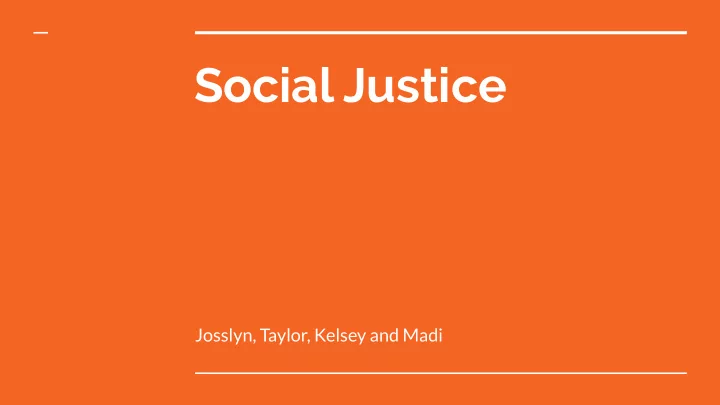

Social Justice Josslyn, Taylor, Kelsey and Madi
Summary Teachers build a ‘social justice’ identity through their relationships, experiences, and personal backgrounds. This identity is known as a determinate identity—having a fixed view of what social justice is based on our own understanding. This article encourages teachers to balance this view with an indeterminate attitude, one that is more fluid and open to change and growth. Once a teacher balances determinate and indeterminate views of social justice, they will have a greater concept of compassion and respect towards others and their needs. In order to enlighten the audience of this idea of determinate and indeterminate views of social justice, psychologists interviewed and studied four beginning teachers based on their positions on social justice. These interviews supported Mark Boylan and Ian Woolsey’s statement of how a “determinate view of social justice teacher identity might obscure the complexity of beginning teachers' positions” (2015). Inquiring about one’s social justice identity can be uncomfortable and challenging as we are encouraged to support and learn how to adopt different views rather than our own on a complex issue. Social justice is something to be practiced rather than understood; something that should constantly be taking us out of our comfort zones. It is also important for teachers to broaden their understanding of social justice beyond their classrooms in order to develop a well-rounded teaching pedagogy.
Chess - Determinate: Go - Indeterminate: Each piece has a “set” territory and Black always starts ● ● restriction of movements Can choose any vertice - freedom of ● Objection: for one team to acquire movements ● territory over the whole board . Objection: Gain more territory than the ● other team
Different degrees of discomfort are possible, ranging from unsettling taken for granted assumptions of those from privileged backgrounds to more emotionally challenging provocations in relation to sources and reproduction of injustice (Boylan, 2009; de Freitas & McAuley, 2008; Tatum, 1992). These two approaches are not mutually exclusive; indeed, one way for discomfort to be generated is through inquiry and once beliefs are discomforted, inquiry may be fostered. What is shared is an underlying ethics of care and respect (Neyland, 2004). Each of them evidences the informed empathy (LadsonBillings, 1999) that is a characteristic of teachers for social justice. It may be that teacher educators need to pay more attention to these underlying ethical concerns and less to the formal and visible reference points of positions taken in relation to social justice issues. This implies that teacher educators seeking to engage beginning teachers with issues of social justice should make such philosophical concerns an explicit aspect of teacher education curricula. Further, the discourses used in education can also productively be the subject for critical reflection by beginning teachers in relation to issues of social justice.
Terms ● Striated/Determinant Identity ● Smooth/Indeterminate Identity ● Affinity Identity
Teacher Education Compassion and Discomfort Respect Determinate (Striated) Social Justice Identity Education Pedagogies Inquiry Indeterminate (Smooth) (Boylan and Woosley, 2014)
Questions This article discusses both determine and indeterminate views of social justice in relation to teacher pedagogy. Although this article suggests that it is important for teachers to possess both views, it does not discuss which view a teacher should hold more of. I think that this question will be answered differently depending on each individual teacher. For me, I believe it is more important to lean towards indeterminate because I think it is crucial for teachers to be open to understanding the beliefs, views and experiences of others, especially of our students. Being open to understanding our students will allow us to better fit the needs of individual students by practicing equity in our classrooms instead of equality. This article discusses how compassion, respect, inquiry and discomfort are pedagogies teachers should strive towards in their teaching practice. I believe these aspects are the foundations for social justice and are all connected and equally important to work towards social justice in our classrooms. I believe one aspect not mentioned in the article that should be included when discussing social justice is openness. I believe teachers need to be willing to be open to learn, discover and respect others and their experiences in order to begin enacting social justice within the classroom.
Activity
Go to www.menti.com and use the code 49 26 27
Recommend
More recommend